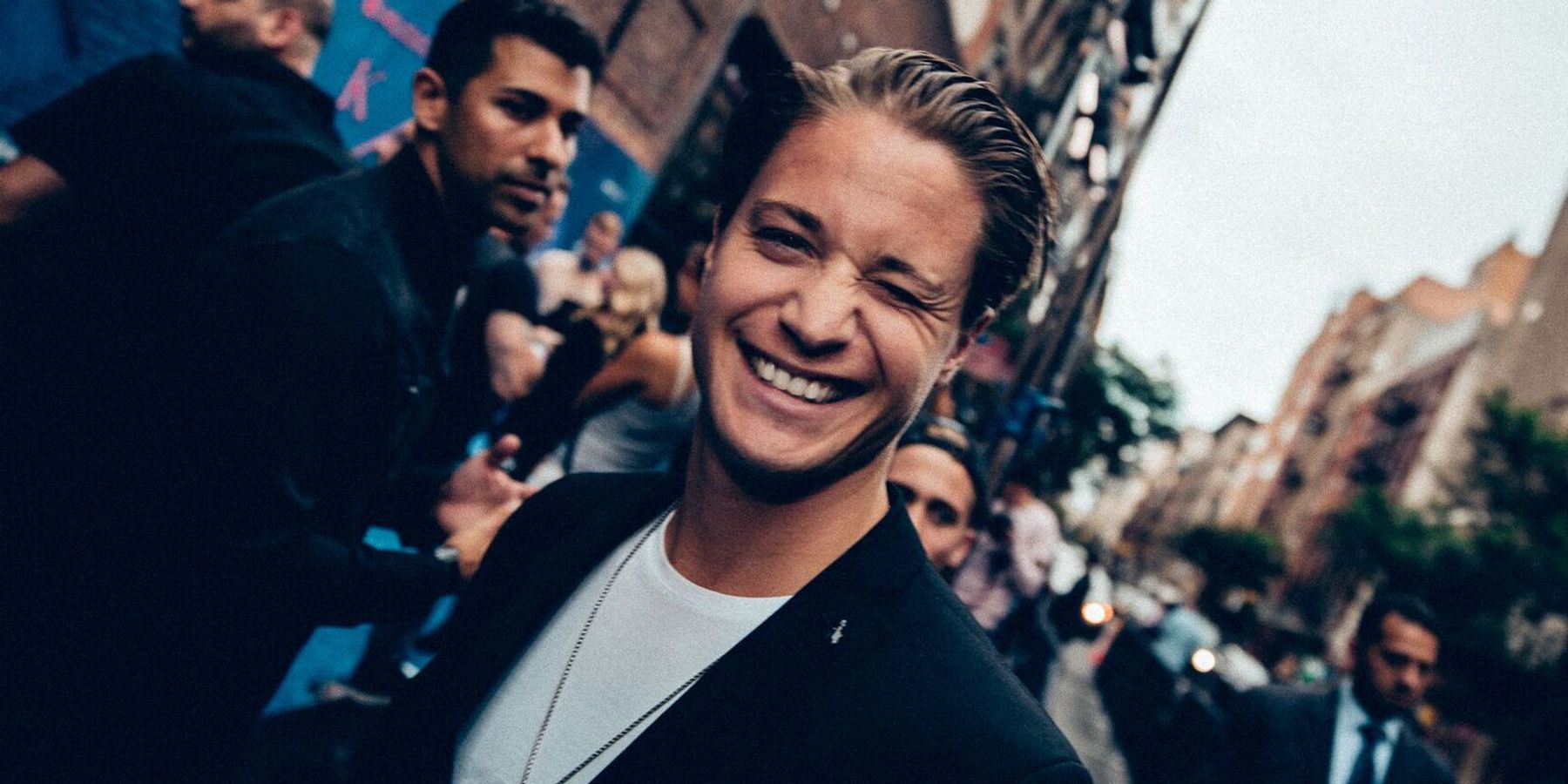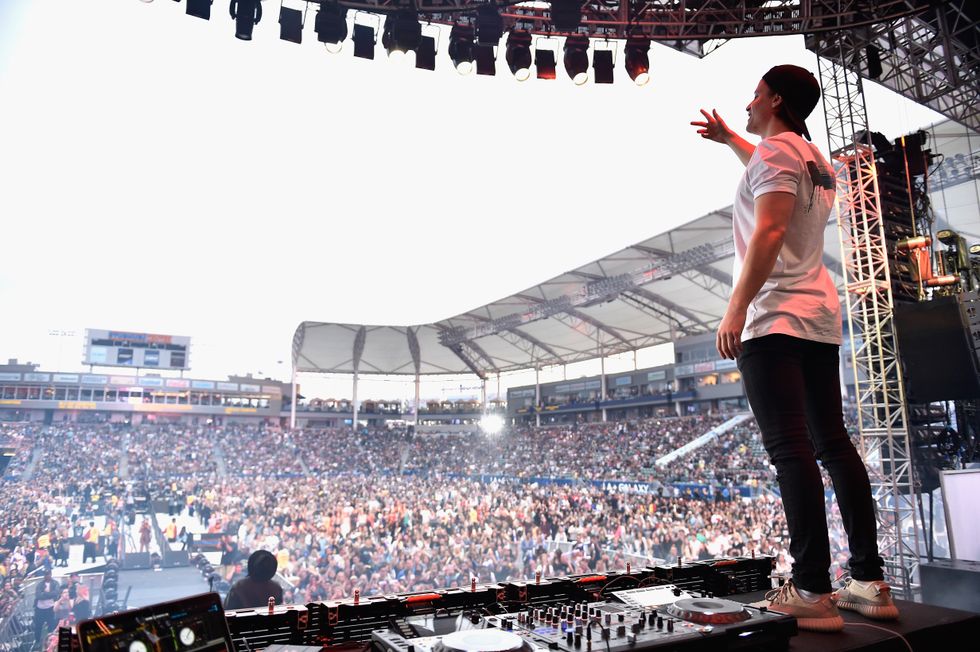
Kygo doesn't believe in astrology. I consider this ironic because, on first impression, the DJ/producer really seems as Virgo as they come. Despite performing around the world in front of tens, sometimes hundreds of thousands of strung-out festival goers, the Norwegian superstar is far from the textbook extrovert. Au contraire, Kygo prefers to politely hang back rather than immediately assume the center of attention. Even first thing in the morning at our meeting in a midtown hotel, Kygo is already composed, quietly confident. Dressed in a plain t-shirt and a snapback of his own design, he's more than chill – he's 'cool.' He doesn't need to impress anyone, because he's been someone for a long time.
Kyrre Gørvell-Dahll's primary rationale for dismissing the zodiac, he tells me, is that he doesn't buy into horoscopes. I get it. Unlike some of us, Kygo doesn't need that extra assurance that everything is going to turn out alright, because for him, it already has. The 25 year-old is entirely self-made, teaching himself to produce and subsequently DJ, exclusively from watching YouTube tutorials. He's known for pioneering the electronic music sub-genre "Tropical House", with hits for Selena Gomez, Parson James and John Legend, stellar remixes, and multiple co-signs from the biggest artists in the world. He's never met Ed Sheeran, but when the Norwegian press asked Sheeran if he'd heard Kygo's remix of "I See Fire," he said he almost liked it better than the original.

These are all names ready to be dropped, and Kygo does, but in such an admiring fashion that it can only be described as an 'anti-flex.' He speaks of his collaborators not as peers, but as idols. Diplo, who requested a mix from Kygo for his radio show, is "amazing. At a starstruck first meeting with Avicii, Kygo was only prepared to tell the Swedish DJ, "Oh, hi you're an inspiration, bye," before the two ended up talking for 10 minutes ("I wasn't ready for it'). " The Weeknd, who he has remixed several times, is "incredible."
"I've been talking a lot to Abel, sorry, The Weeknd," Kygo corrects excitedly. "That's kind of my dream collaboration, so hopefully... He's amazing. His old songs, like Trilogy, would have been huge radio smashes today, if more people had known about him."
In addition to being "amazing," everyone is also "super nice." Like Selena Gomez, who Kygo met by chance at a 1Oak Grammys afterparty, three days before their now-smash hit collaboration "It Ain't Me" was set to drop. "It Ain't Me" is now comfortably sitting at nearly a billion streams between YouTube and Spotify, something for which Gomez is definitely not entirely responsible, rather, Kygo's most-listened tracks on the latter streaming service reads like a "Greatest Hits" list. Unlike other musicians, however, who consider their art beyond calculable value in streams or follows, Kygo doesn't mind promoters or press evaluating his worth by the numbers next to his name.
In fact, to Kygo, the commercial side of the industry has "always made the most sense." Perhaps because the producer was a business and finance major before his music started picking up. Taking cues from Avicii (his "inspiration") Kygo began uploading one remix to SoundCloud a month, then sharing to a Facebook page that didn't have a single picture of him. Within a year he had tens of thousands of fans, all affirming their devotion with consistent 'likes.' While his grades plummeted, Kygo's star was on the rise. Much to the chagrin of his father, who desperately hoped he would have a stable back-up career, Kygo dropped out of school. A month later, he was leaving to play a sold-out tour of the States.
"The only thing we had then was online hype," he remembers, "so all my dad knew was who followed me on social media. He just said to me, you know, you can't live like this, so many people are doing the same thing."
"For that older generation, it's tough for them to keep up," Kygo explains, shrugging. "He could see 50,000 plays on a remix and it meant nothing to him."
The waitress saunters over to take our order and Kygo gently enquires about ham-and-cheese toast, which is not on the menu. Misunderstanding, the young woman begins listing off the types of bread the restaurant has ("white, whole-grain, gluten-free…") and Kygo, instead of correcting her, orders off the menu — a salmon bagel. While many in his position would have pushed for this relatively low key request, Kygo settled. He doesn't want to make a fuss.

The stock phrase "you can't please everyone" does not seem to apply to Kygo, who has an international reputation as one of the loveliest guys in the game. This is saying a lot when you consider that Kygo very much falls into the 'EDM bro' bracket — largely considered either douchey or dense (Take one look at James Van Der Beek's portrayal of Diplo in new VICE-produced series What Would Diplo Do? and you get the gist).
Humility, however, has spurred Kygo's career much faster than stunting and self-promotion ever could. For all his popularity, though, the Scandinavian has never been one to laud his own talent (something that's frowned upon in his culture). Earlier in his career, Kygo consistently played stages that were too small. The fact that too many people would turn up to his set and couldn't get in became a headline. He's grateful, he says, that the story didn't play out the other way round — playing a headlining stage for a sparse crowd before he was ready.
"The first big kind of arena or show I did we booked this huge venue in Norway, and me, as a Scandinavian, I was nervous we wouldn't fill it, whereas Miles [his manager] was like, 'No you're playing this venue.' That was really nerve-wracking, I didn't want to fuck up in my own country. It sold out."
That's incredible, I say.
"Yeah, we were lucky," Kygo corrects.
Kygo acknowledges he will be forever indebted to social media for his "hype." The producer very much represents the new wave of artists that subvert the traditional press channels to rustle up support. Kygo tells me he's never had much of an affinity for the media in general, lowering his voice co-conspiratorially to reveal his distaste for interviews, in particular.
"It's not my favorite thing," he says. "I don't want to go to a few hundred radio stations in the US all the time and convince them to play my music."
The most arduous part of the process, he shares, is that most hosts ask him exactly the same questions, over and over — namely, what on earth would inspire a business student from a country that reaches a high of 64 degrees in July create something recognized internationally as 'tropical house.' But that's never a label Kygo asked for, nor a sound he sought to be defined by ("people always want to put you in a box"). Kygo prefers to describe his sound as "happy synth," which he created after predicting a waning interest in the heavy monotony of traditional house. His success with trop house has since inspired an army of copycats, but that doesn't mean the producer is banking on the style's longevity. In fact, with impressive self-awareness, he says he doesn't necessarily see a future for the sub-genre.
"If I keep making the music I'm making now, it's not going to last for long," he says. "I could still use elements of it, that tropical vibe, but it's about finding new ways to make it relevant. If you can make a melody or music to stay fresh, maybe it can remain popular. But I can't make "Stole the Show" number two or three even though my fans want it. I've already done that."
Kygo's not hungry this early in the morning. He's barely touched his second-choice salmon bagel, although his lack of appetite is not from heavy partying — as one might assume of an international DJ. Kygo has been very open about his dislike for drugs, vodka Redbulls prior to performing, or a nice gin and tonic. He's reportedly dated the same girlfriend since university, and while he says he "does party" you won't find him raving past dawn.
"It's also just about the people you surround yourself with," the 25 year-old reveals with almost smug matter-of-factness. "If you surround yourself with the people that take drugs every night maybe the temptation would get to you."
"When you're on the road you can't party all the time," he informs me. "Too much drinking just isn't healthy."
When the road brings Kygo to New York, he is happy. It's clear that our waitress, who returns to collect his plate, has no clue who he is — and that's just the way Kygo likes it. Fan interactions, he reveals, can be disheartening.
"People will come up to my manager and ask, 'Can I take a photo with him?' As if I'm not there. Like I can't even speak. Like, "Can I take a photo with that robot?"
This is the reaction he can expect from his home country, Norway, which like many small nations, is both immensely proud and deeply jealous of their successful exports. It's a classic case of 'Tall Poppy Syndrome' — god forbid if someone who rises above the crop should celebrate, rather than apologize for their success. Kygo admits he can't credit his own country for kicking off his career, it was due to his very vocal overseas following that he even became a name Norway would recognize. Now, he says, he receives an exorbitant amount of publicity via the Norwegian press, though only very rarely do they champion him.

"I get the worst reviews ever from Norwegian newspapers. The worst ever." He tells me, chuckling. "I don't know, they just don't like me. They're very 'cool'," Kygo says, raising his hands to form quotation marks. "They would pick up a local rapper that would have, no offense, a crappy song, and they would give it a six out of six, because they want to be cool and underground. I remember when I released my first original song and it got like three out of six. Because it was 'boring' and this and that. It actually hurt."
This is the about as close as Kygo to expressing any kind of emotion regarding the rollercoaster that has been career. In the same way he's not about to brag about collaborating with Selena Gomez, nor his going to truly his disappointment with something so minor as a skewering by a Norwegian music journalist who resents mainstream success. That's just not who he is. So he recovers."But [the bad review] was about "Firestone" and it ended up doing super well," he clarifies, referencing his breakout hit with Australian Conrad Sewell that shimmied its way onto the Billboard Hot 100.
"Stole the Show" [with Parson James] was also 'bad.' Then I realized that I'm never going to please them, and I'm also in a position where I don't need them."
He's right. Kygo doesn't need the approval of a small-time music publication, or the entertainment section of a national Norwegian newspaper. He has a residency in Ibiza. He has up-and-coming artists beating down his door for collaborations to elevate their careers. He even launched lifestyle store, "Kygo Life," which sells everything from women's clothes to electronics. This week, Kygo's life story, aptly named Kygo: Stole the Show, featuring everyone from superstar DJs Martin Garrix and Steve Aoki to Kygo's own parents, became the number one documentary in the US. Most impressively, Kygo is credited with an entire subgenre of music. His fans could care less about a three out of six.
"I always make something that feels good for me, you know? But when it comes to melodies, what feels good, it turns out I have the same taste as a lot of other people."
As our breakfast comes to a close he asks me what are the "typical" traits of Virgos. I tell him, critical, considerate, humble, highly precise. Perfectionists. I'm defensive, worrying he thinks I'm some crystal-obsessed kook and that, after spending the morning with him, I'm making up these characteristics so he fits the bill. Who needs the stars when you already are one?
"I don't know," Kygo shrugs as I depart, "sounds like there might be something in it."
Images supplied/via Getty